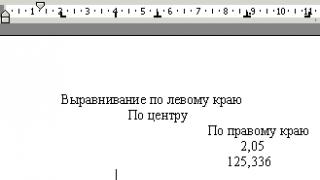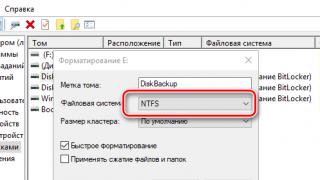Surely in the process of using the Internet you have come across the term cookies. What it is? Essentially, a cookie is a file or several small files that store text information. They are created when you visit sites that support this technology.
How do cookies work?
Everything is very simple. As soon as the browser receives a certain web page from the site, the connection between it and your PC is broken. If you decide to go to another page of the same resource or update the current one, a new connection will be established. On sites where there is no user authorization, this does not create any problems. But if it is necessary, without additional measures the resource is not able to “remember” the people visiting it and display information in accordance with the preferences of each of them. Avoid a situation in which, moving between different pages site, the person is not perceived by the service as a new, unauthorized visitor, cookies help. What is textual information, you already know. And cookies work very simply: when you move from one page to another, the server sends a request to the computer for data from cookies. With the help of them, he finds out who is going to perform such an action, and then, based on the information received, grants or refuses the request. Cookies are also used when creating online stores. It is thanks to them that the usual basket can exist, in which data about selected, but not yet processed goods are stored. And it is cookies that allow the specified products not to disappear from it while you are browsing other parts of the catalog and placing an order.
Why are cookies useful?
You already know about several aspects use of cookies s. What is it, we also managed to find out. Now let's talk about what else can be useful this technology and in what cases it can not be dispensed with.
Surely you know that now so-called "affiliate programs" operate on many services. Almost all of them are long-term and last for months or even years. Throughout this period, information is stored on the hard drive, thanks to which the partner will receive his percentage if the user who clicked on his link orders a service or product from the seller.
When working with hit counters, rating and voting systems, cookies are also used. What does it give in this case? Cookies are necessary so that the system can determine that given user already followed the link or left your vote. That is, there is some kind of insurance against artificial markups. There are ways to bypass such protection, but for ordinary users this result is more than enough.

What should be feared?
When working with cookies, it is important to remember that in some cases, seemingly harmless textual information can be dangerous.
Cookies are one of the most important potential causes of online privacy violations. Why is this happening? Advertising sites always keep track of which ads a particular user is viewing. Cookies store data about which ads a person has already seen, track which topics are of interest to him. And while we are talking about cookies for a particular site, there is no need to talk about the leakage of personal information. But if we are talking about large advertising networks, whose codes are present on the vast majority of resources, everything becomes more complicated. So, thanks to the system, it can collect almost all information about human activity on the network. And if on some site he enters his first and last name, it becomes possible to associate all these actions with a real person.
There are other problems related to cookies. Mostly programmers who write code document. cookies for different sites. Without first reading professional sources, you can allow cookies to store logins and passwords from the site. As a result, it becomes very easy to remove them and use them for your own purposes. However, almost all more or less serious sites store passwords and logins in a database on the server. Cookies are used here simply as a conditional identifier for the user. Moreover, it is issued only for a short period of time. That is, even if a hacker manages to gain access to cookies, no valuable information he won't find it there.
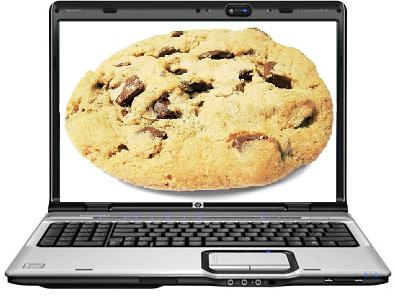
How to enable, disable and clear cookies?
If you choose to disable cookies, please note that you will need to re-enable them each time you go to a site that requires it.
For Mozilla Firefox. We go to "Tools". Next, you should find the "Settings" item, and in it - the "Privacy" tab. Opposite Firefox in the “History” frame, you need to select the “do not remember” item from the list.
For Google Chrome. Open “Options” by clicking on the button in the form After that, go to “Advanced” -> “Content settings”. In the window that appears, select the Cookie item, and then check the item that prohibits the saving of data by sites.
As you can see, disable or re-enable cookies in Chrome and Mozilla Firefox, the most popular browsers, very simple. In other browsers, this is done in the same way, using the "Security", "Privacy" tabs, etc.
If you need to clear your cookies, it's faster and easier to do it without using standard means browser, and using special utility- cCleaner. Before cleaning, you need to close all browsers, otherwise you will not be able to delete all cookies.
But in general best option- install one of the programs that automate the work with cookies. Now there are such applications. great amount, they weigh quite a lot and relieve users of the need to constantly change the parameters manually.
From the author: In this article, we will look at what are cookies(cookies) and what it is eaten with. Because HTTP protocol does not support saving data between two different transactions, sessions and cookies were invented. This greatly simplifies the work of both programmers and users. The first gives the opportunity to store data about the user, the other is good due to the fact that now they do not need to re-enter data about themselves every time (email, login, icq, etc.) and something like that ...
Cookies (as well as sessions) are used everywhere: in online stores, on forums, etc. Cookies are needed in cases where you want to save certain information over several pages. Or throughout the session.
Before studying the lesson "What are cookies?", I recommend that you use your computer!
First, let's talk about cookies, as, roughly speaking, a kind of session.
Definition
Let's define that Cookies are text strings, stored on the client side, and containing name-value pairs that are associated with a URL by which the browser determines whether cookies should be sent to the server.

Framework YII2. Rapid development with a modern PHP framework
Learn the subtleties modern web development using the YII2 framework
Installation
Installation is very simple, just a single function - setcookie
Syntax for setcookie:
bool setcookie(string name, string value, int expire, string path, string domain, int secure);Name- the name of the cookie to be set
value- the value of the persisted cookie named name
Expire- cookie lifetime
Path- the path where the cookie is available
domain– the domain from which the cookie is available
secure- a directive that determines whether the cookie is available not on an HTTPPS request. By default, this directive is set to 0, which means that the cookie can be accessed by a normal HTTP request.
An example of the use of cookies
Now it's time to get acquainted with simple example use of cookies. This will be a simple count of page views by the user.
I refreshed the page 12 times and the cookie named views was set to "12".

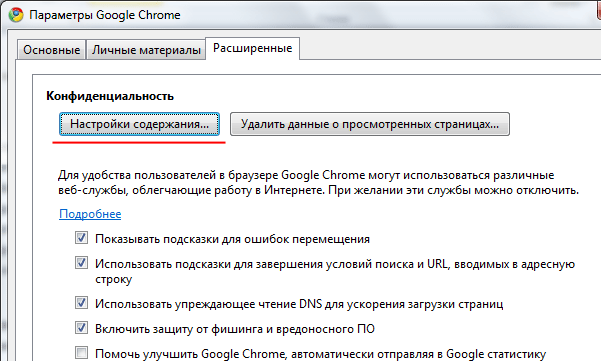
![]()

Here we saw the whole code as a whole, and now we will analyze it in particular. Let's read it verbatim first.
Block 1
If such a SUPERGLOBAL variable exists $_COOKIE['views'] With name ' views’, then we simply assign its value to the $views variable and pre-increment it ( ++$views; identical Sviews= $views +1;). Next comes the condition again: if it is impossible to write a cookie in the client's browser, then display a message to allow it to write cookies.
End of 1st block
/***insert***/
setcookie('views', $views)– php function for writing cookies to the client's browser. Where ' views‘ is the name of the cookie, and $views is a variable that contains the value of the cookie being written.
/***insert***/
Block 2
If $_COOKIE["views"]) does not exist, then instead of operations $views = $_COOKIE["views"]; ++$views; we'll set the $views variable to one. $views=1; And the rest is the same as in the first block.
End of 2nd block
If $_COOKIE["views"]) does not exist, then instead of $views = $_COOKIE["views"]; ++$views; we'll set the $views variable to one. $views=1; And the rest is the same as in the first block.
Cookie lifetime
If we want the cookie value to persist after the user closes the session, then we need to set the third parameter of the setcookie() function.
You can install it in several ways. There are two of them, maybe someone knows more, but I use these two. The first is to set the lifetime using the built-in php functions time(), the second is an improved version of mktime().
time() allows you to translate current time in seconds since the beginning of the epoch, it started around 1975.
mktime() allows us to translate any time we understand (such as 20-01-2010 17:45:08) into a second since the beginning of the epoch.
Syntax:
intmktime(;
Only now in a new file index.php, which is in the web directory instead of:
setcookie("views", $views,time()+60*60*24)
You will need to rewrite to this:
Setcookie("viewsweb", $views,time()+60*60*24,"web/index.php")
where "web/index.php" means that this cookie can only be accessed from http://sessionsandcookies.gromitsu/web/
web/index.php code:
And now, for clarity, let's create another test.php file in the root of the site with the following code:
"; echo "Cookies from http://sessionsandcookies.gromitsu/ viewsweb = ".$_COOKIE["views"]; ?>
Example in pictures

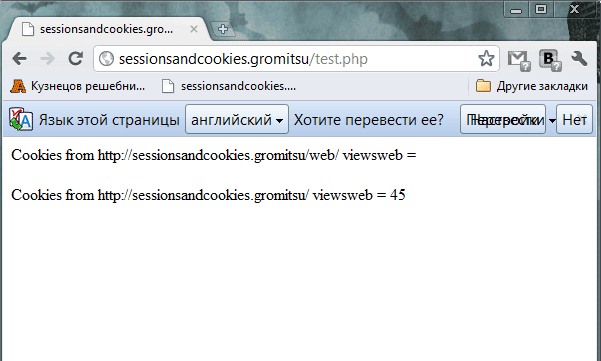
Domain access
Almost the same as in the example above, only setcookie will look like this:
Setcookie("viewsweb", $views,time()+60*60*24,"web/index.php",".sessionsandcookies.gromitsu")
With this restriction, the domain can take the form mysessionsandcookies.gromitsu or
your.sessionsandcookies.gromitsu.
Data encryption
You can write a separate article for this part of our wonderful lesson. So here we're just going to gallop through Europe. Let's look at the code:
this is enscrypted viewsdecoded = $shyfr
";
?>
Decryption
this is enscrypted viewsdecoded = $shyfr2
";
?>
Conclusion
I think I have described a lot about cookies, naturally for a beginner in this matter. And as always the main task programmer, it is good to protect the script (script) written by him. And this protection can be devoted to an entire article.
If you have already reached this point, then you have understood the basic principles of working with cookies, and you can already put them into practice.
Cookies are used almost everywhere where you need to save data between transactions (requests to visit pages). This is, for example, saving data during authorization (a password and login are automatically entered for you, of course, the password is well encrypted), or, for example, in online stores (saving the goods that you put in the basket, even if you closed the browser and returned, for example, where within an hour, the basket has not yet been emptied).
On this, lesson what are cookies and how to eat them for beginners, completed.
Edition: Rog Viktor and Andrei Bernatsky. webformyself command.
"Cybersant Webmaster" - the most full course on site building in Runet!
Almost everyone Windows user met with such a concept as cookies. What is it, why they are needed and why it is desirable to clean them, read in the framework of this publication.
What is a cookie?
A cookie is a text file with data that is written to the browser by the server of the site you are visiting. These data are:
- login and password information;
- individual settings and user preferences;
- visit statistics, etc.
With this data, the site you visited will be able to identify you. It happens like this:
- the site server polls the browser for information in the cookie file;
- the browser provides this information by sending a response to the server;
- depending on what information the site server receives, you will be identified or found for the site new personality(if cookies are cleared).
The main parameter of a cookie is its expiration date. By default, this is one computer session. Files are deleted when the browser is closed. If they have an expiration date, they become permanent, and are removed when they expire or by the browser's cleanup function.
What are they needed for?
First of all, they are needed for the convenience of using the Internet. For example, once you enter your profile on the site, you will not need to constantly enter your login and password after closing the tab.
Also, thanks to cookies, individual account settings are saved. For example, some sites offer to add to favorites, change the design, change the interface using such files with an expiration date.
Where are they stored?
The files are saved in the user's folder. Each browser has its own way:
- Opera C:\Users\UserName\AppData\Local\Opera Software\Opera
- Google Chrome C:\Users\UserName\AppData\Local\Chromium
- Yandex.Browser C:\Users\UserName\AppData\Local\Yandex\YandexBrowser
- Mozilla Firefox C:\Users\UserName\AppData\Local\Mozilla\Firefox
Why clean?
It is advisable to clear cookies from time to time. In addition to being useful, they can also bring some inconveniences:
- They provide fast access to your profiles without entering a login and password. If the computer is stranger, he will be able to access your personal data.
- In addition, if a stranger is at your computer, uncleared cookies can be used to track your browsing history. This is bad from a privacy point of view.
- If the site does not properly handle your cookie, you may not be able to log in to your profile, or some functions on the web service will not work correctly.
How to clean?
I will give an example of cleaning for popular browsers:
How to disable?
In general, the creation of cookies can be disabled in the browser. This feature is available in all popular browsers, so there shouldn't be any problems. But after disabling this feature, some sites may stop working, as they interact with the user exclusively through cookies.
To disable in popular browsers:
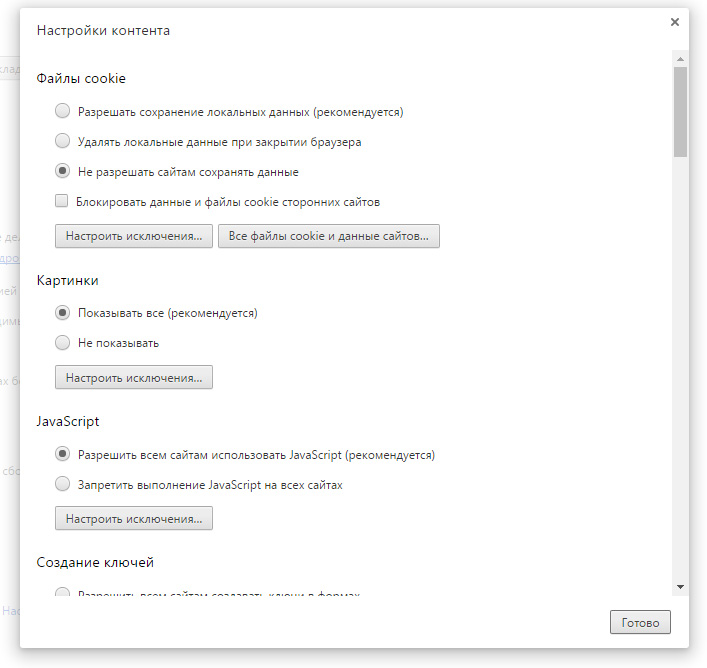
Advice! If you see notifications in your browser: “cookies must be allowed” or “an attempt to store a cookie was blocked”, then your browser does not store cookies by default. Open settings and turn on saving cookies.
A cookie is not a cookie, as the name suggests, but a small text mark placed on your computer by a particular website. Any website can add cookies to your computer to maximum setting, personalization of your record and user identification.
Cookie - what is it?
You probably often notice that when you go to the same site, for example: VKontakte, you do not have to enter your password and phone number all the time, and this is the merit of such data that was previously saved on your computer. Most often, they can record several characters for quick navigation on the site and a hash identifier. Such an identifier is any constant, most likely taken from your record, which, in combination with the so-called "salt", is encrypted by any option convenient for the resource administrator. This is usually md5 and stores a 64 bit hash which is useful for user identification.
When you visit the site again, the key data is saved again, with a different identifier, and so on all the time. The most unimportant or time-dependent files, administrators install with a mark. When restarted or after some time has elapsed, they are deleted.
Cookies are small pieces of data, so they are a limited storage variable and cannot exceed 4kb.
What are cookies used for?
The main task is, of course, convenience, expressed in the maximum personalization of the type presented to the user, the main goals are:
- User authentication, in other words, is the ability to distinguish one from another without sending a query to the database with the user's login and password entered;
- Saves the filters selected on a particular site, your preferences in choosing a product, etc.;
- For security-conscious services, the important thing is the session, which is represented as the same hash;
- As you understand, this is a double-edged sword, and you can also be included in the statistics. Basically it is not harmful, you can call it a sociological survey of people.
What's happened blue screen of death? Common windows errors and methods for their solution
This possibility is far from being a panacea for the security and storage of personal data on sites. There are certain viruses that can intercept your cookies for their own purposes, but they are not very common due to the many complexities involved. Also, any user can delete the data that is stored on his computer.
There are also more advanced versions of cookies that allow you to be identified from a different browser and with cleared cookies.
This became possible thanks to the storage of cookies in 10 or more places, even in the pictures that you download, and immediately after entering the site, they are all restored, even if there is only one copy left. Such algorithms are very complex and have only been used in test modes, for demonstration, but perhaps some services use this approach.
You can safely remove Cookies from your computer, you will not suffer significantly from this, you only have to enter passwords again. It is even recommended to clear cookies from time to time, because when long work with browser and visit more pages, they can weigh 0.5 GB each, which makes it difficult fast work system and the browser itself.
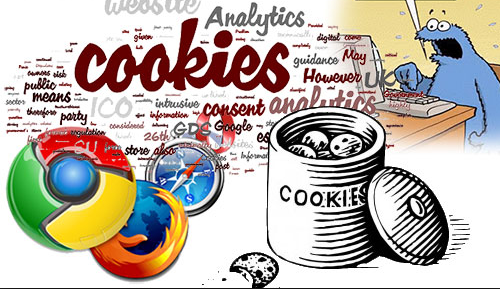 Similar to Cookies or they are also used in others computer programs, because it is impossible to interact with the user without receiving from him necessary information. It happens that you visited the site only a few times and it was 2 weeks ago, and its Cookies can still be stored on your computer, for this, clear given repository at least once a week.
Similar to Cookies or they are also used in others computer programs, because it is impossible to interact with the user without receiving from him necessary information. It happens that you visited the site only a few times and it was 2 weeks ago, and its Cookies can still be stored on your computer, for this, clear given repository at least once a week.
How to clear cookies?
The simplest tool and at the same time effective, just go to the appropriate section, which, by the way, is located in approximately the same place in all browsers, and delete it, for this you should:
The task manager has been disabled by the administrator, how to solve the problem?
1. Launch the browser and go to its menu;
2. Go from this menu to the "History" tab or, if there is none, to "Settings" and then to the desired tab;
3. Before you will be all your history, you need to click the "Clear History" button;
 4. Along with your history, or without it, you can delete various other data that is stored directly on your computer, the main thing is to check the box "Cookies and other site data" and click "Clear history".
4. Along with your history, or without it, you can delete various other data that is stored directly on your computer, the main thing is to check the box "Cookies and other site data" and click "Clear history".
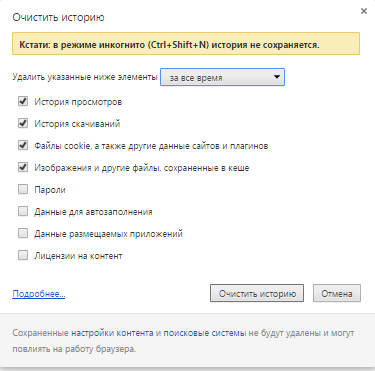 This option is fully functional, but its disadvantage is the length of the procedure and inflexibility in matters related to deleting Cookies from some sites, and saving them from others.
This option is fully functional, but its disadvantage is the length of the procedure and inflexibility in matters related to deleting Cookies from some sites, and saving them from others.
Ordinary Internet users rarely think about what is cookie data and what they are for. The most "advanced" user knows that cookies need to be cleared periodically for security purposes. This is where the user's information is limited. However, the webmaster needs to have a more detailed understanding of this useful tool.
First you need to find out what cookies are in a browser. This term refers to small text files, stored on the user's computer and capable of loading some of the information into the browser. Cookies are automatically loaded when a user revisits a site they have already visited.
What are Cookies for?
These text files can make web surfing much more convenient. Cookies can perform the following functions:
- storage of data for authorization (login, password);
- optimization of traffic consumption;
- setting the parameters of frequently visited sites (language of communication, time);
- the ability to continue placing an interrupted order in the online store.
Novice webmasters are often interested in what a cookie means for a site owner and what is its practical use. Cookies allow advertisers to track the preferences of Internet users, which allows them to show them relevant ads. The cookie also stores information about visitors who have gone to the online store from the partner site that placed the advertisement. This allows you to keep statistics of purchases and pay the partner the due remuneration.
Tracking cookies - what are they?
Compared to others network technologies, text cookies are considered relatively safe. However, specialists from Symantec, a software development company, have identified a negative trend. Modern Internet giants (in particular, Google search engine) often send "tracking" cookies, also called Tracking Cookies, to their users.
Tracking files collect statistics about user preferences. Most likely, this information is used to generate targeted advertising. Many experts regard this as an attempt to obtain unauthorized personal data.
Interesting fact! Some antiviruses are able to detect tracking files and notify the user that they are Tracking Cookies.
Cookies and security
In the data text documents can be stored important information e.g. login and password from payment system. To exclude the possibility of stealing cookies, serious sites transfer data through a secure https protocol://. However, not all sites care about the interests of their visitors. Therefore, for safety reasons, cookies should be cleaned periodically.
You can delete cookies in your browser settings. Google Chrome owners will need to run the following command "settings" >> section personal data >> "clear history". You can select the appropriate time interval. IN Firefox browser cookies are deleted as follows: "settings" >> "privacy" >> "delete individual cookies".
Exist special programs capable of deleting user history and cookies. One of the most common PC cleaning tools is CCleaner.

